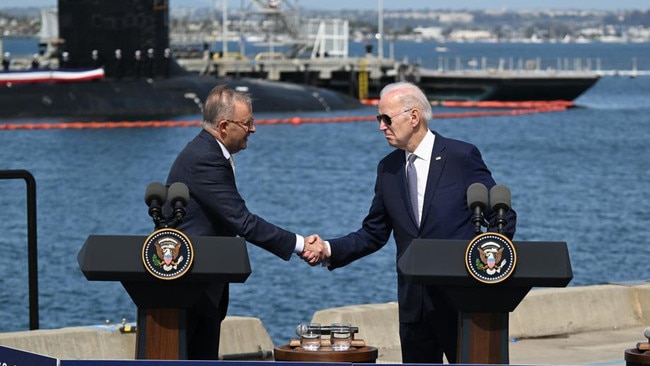Republicans and Democrats agree to early 2030s transfer of nuclear-powered submarines to Australia
After months of wrangling Democrats and Republicans have agreed to remove legal impediments to the transfer of three Virginia-class nuclear-powered subs to Australia.

Congress is poised to pass critical legislation as soon as next week that would bring the AUKUS security pact between the US, Australia and the UK a big step closer to reality, giving the green light to the transfer of nuclear-powered submarines to the navy in the early 2030s.
After months of wrangling on Capitol Hill, the House of Representatives and the Senate and their respective Republican and Democrat majorities have agreed to remove legal impediments that would have thwarted the transfer of submarines and other advanced military technology.
“For the first time since the launch of the USS Nautilus in 1958, this National Defence Authorisation Act authorises the US Navy to sell three conventionally-armed, nuclear-powered submarines to another nation — our steadfast ally Australia,” said Democratic congressman Joe Courtney.
“It streamlines technology sharing among the three AUKUS allies under the umbrella of the Defence Production Act to strengthen deterrence in the Indo-Pacific”.

The agreement also includes the training of Australian defence personnel and facilitation of the acceptance of a US$3 billion contribution Australia has undertaken to provide the US to help expand US domestic submarine production.
According to comments made last month by US Vice Admiral William Houston, the US navy envisages the transfer of two Virginia class submarines from existing US inventory, and a third directly from the production line, would begin in 2032.
Republican senators had held up efforts in July to operationalise AUKUS, demanding the White House provide additional funding for the US submarine industrial base, which has struggled to meet the US navy’s needs for additional submarines to compete with China’s expanding fleet.
In October the White House proposed an extra US$3.4 billion to fund the US submarine production, funding that remains held up by a political fight between Republicans and Democrats over aid to Israel, Ukraine and reforms to security on the southern border.
“We are producing about 1.2 attack submarines a year rather than the 2.3 necessary to fulfil the AUKUS agreement and meet US requirements. We have no time to waste as Xi Jinping grows his fleet in the largest military build-up since World War II,” said Republican Senator Roger Wicker in a statement to The Australian.
The 3,000 page plus NDAA, which will provide US$886 billion in funding US defence forces, is expected to pass bother chambers next week before being sent to the White House for the president’s signature.
The passage of the bill will leave any element of the AUKUS deal, which first emerged in September 2021, vulnerable only to adverse political decisions by any future leader in the US, UK or Australia, after Australia’s parliament last month passed legislation to facilitate technology sharing among the three AUKUS nations.
Spotted in the Senate subway: the print version of the 3,000+ page NDAA pic.twitter.com/HponGtqQhj
— Caroline Coudriet (@cscoudriet) December 7, 2023
Republicans and Democrats had also been divided a range of social issues Republicans wanted addressed in the NDAA, including scrapping military funding for abortions and diversity equity and inclusion programs.
Influential Republican congressman Chip Roy described the compromise as a “a crappy, watered down NDAA (losing most of the stuff we fought for – abortion, transgender, CRT/DEI)”.
So the @HouseGOP is going to work with Democrats to pass a crappy, watered down NDAA (losing most of the stuff we fought for - abortion, transgender, CRT/DEI) along with an almost 4 month continuation of FISA (spying on Americans with no reforms yet)? #NameOneThing
— Chip Roy (@chiproytx) December 6, 2023
The breakthrough deal emerged as Kurt Campbell, the president’s top adviser on the Indo-Pacific and one of the architects of the AUKUS agreement, faced questions from the Senate foreign relations committee ahead of his likely confirmation to succeed Wendy Sherman as deputy secretary of state.
“AUKUS is for a significant, inspirational, powerful program not just on submarines but on technology for the future,” Mr
Campbell told the senators.
Chairman of the Senate foreign relations committee, Senator Ben Cardin, said in the same hearing he was “very optimistic” congress would move forward with AUKUS next week.






To join the conversation, please log in. Don't have an account? Register
Join the conversation, you are commenting as Logout